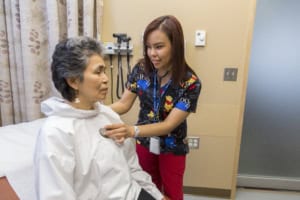Family Caregivers and Alzheimer’s Disease Awareness Month
By Southcentral Foundation Corporate Communications

When caregivers tend to their own wellness, everyone benefits.
Caregivers often find themselves juggling multiple responsibilities — providing emotional and physical care, managing a household, medications, and helping to make health care decisions. While it is important to recognize all that caregivers do for others, it also critical to understand that caregivers need care too.
November is Family Caregivers Awareness Month and National Alzheimer’s Disease Awareness Month, and both aim to improve the lives of those providing and receiving care.
A caregiver can be a partner, child, sibling, friend, spouse, or anyone who attends to the health and well-being of another. Each of these relationships is unique and can be incredibly rewarding, but it can also be physically and emotionally draining and have serious health impacts.
In 2023, caregivers in the U.S. provided an astounding 18 billion unpaid hours of care for people with Alzheimer’s or other forms of dementia. Sixty percent of those caregivers report high or very high stress levels, and that stress contributes to rates of cardiovascular disease, depression, anxiety, and chronic health conditions at much higher rates than the national average.
Chris Piromalli, an integrated palliative medicine physician at Southcentral Foundation, spoke to the difficulty in maintaining wellness for both those giving and receiving care.
“Alzheimer’s disease has rippling impacts on customer-owners, families, and friends,” Piromalli shared.
There can be profound grief experienced by all those involved, especially since Alzheimer’s disease can have significant impacts on various aspects of life including physical, mental, social, spiritual, and financial impacts.”
Clinton Brown II is a customer-owner who experienced firsthand the challenges of full-time caregiving for his father, who was diagnosed with Alzheimer’s dementia in his 80s.
“No two people who are suffering, are suffering the same way. In a lot of cases, there are similarities, but we are all dealing with different circumstances,’’ Brown said.
Although it is easy to overlook one’s own health when providing for the needs of another, it is important, Piromalli said, for caregivers to maintain wellness to remain strong and grounded. As a result, they can provide the best possible care for their loved ones.
“I have often heard that being a caregiver for someone with Alzheimer’s is like running a marathon,” Piromalli said. “Caregiving is often needed for years and these needs gradually increase over time.”
Consider the following tips for caregiver wellness:
Acknowledge the effects of the disease and the powerful emotions that arise. Anxiety, stress, and anger can be felt by everyone involved. You might feel selfish or guilty when taking time for yourself, but before you become emotionally overwhelmed, you might consider seeing a therapist who can provide support.
Maintain and foster connections with others to avoid social isolation. Take the time for a lunch date or a phone call with a friend. Join a support group to meet and share feelings.
Look for and enjoy the good things. Savor the moments of clarity and the small things that bring joy.
Try not to take things personally. People with dementia can have drastic changes in personality, mood, or memory, and may not remember their own children. Understand that dementia can cause people to do and say things they don’t mean.
Take a break. Do something that makes you feel better and let the small things go. Exercise of any form or length is a positive thing. You might try breathing techniques or watching a favorite show or movie. Don’t hesitate to ask others for help.
A caregiver, it is important to love and help yourself. When you care for your own wellness, everyone benefits.
For more information or support with your caregiver journey, contact your primary care team or Behavioral Health.


